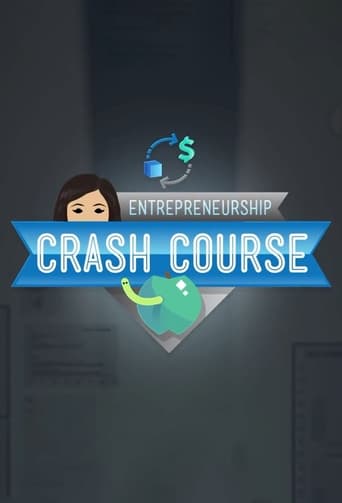Crash Course Business - Entrepreneurship Season 1

In 17 episodes, Anna Akana will teach you entrepreneurship skills to help you start and run a small business. This course is based on a college-level curriculum with a variety of reference texts, including the Strategyzer Business Model Canvas.
Watch NowWith 30 Day Free Trial!
Crash Course Business - Entrepreneurship
2019
In 17 episodes, Anna Akana will teach you entrepreneurship skills to help you start and run a small business. This course is based on a college-level curriculum with a variety of reference texts, including the Strategyzer Business Model Canvas. By the end of the course, you will be able to: * Evaluate the quality of an idea and take steps to turn it into a small business * Understand the legal basics of business entity formation, sales, costs, and other finances * Develop a clear value proposition for your business and customer relationships * Navigate other businesses, including both competition and key partners * Define success for yourself as an entrepreneur, and recognize failure
Watch Trailer
With 30 Day Free Trial!
Crash Course Business - Entrepreneurship Season 1 Full Episode Guide
In business, growth basically means making a company more successful in some way: finding a new revenue stream, revamping the cost structure to minimize expenses and increase profit, or adding new people and knowledge to the team. Our options for growth are usually tied to the type of business model we started with. There actually is a difference between a startup and a small business.
This episode is near the end of this series, but entrepreneurship isn’t a linear journey. You might need funding to accomplish any of the steps to build a business, not just when you’re ready to take a product or service to market. Some people look for money for their minimum viable product. Some market their product or service once everything is set up. And if you believe Silicon Valley legends, a few people get funding with just an idea. But where should we look?
Honestly, “spreadsheets” are kind of the vegetables of the business world -- the very idea of them makes some people queasy. But that’s ok! They can be intimidating, but they’re not impossible to understand. Today we’re going to learn to love ‘em, because basic accounting can make or break a business. If we lose track of expenses or overestimate a revenue stream, we might end up questioning where all the money has gone.
So we’ve learned a lot of strategies to fight off failure. But we could be doing all this right and still fail if we straight-up run out of money. Expenses can pop-up, supplies can suddenly be hard to find, or delivering the most value to customers can involve some expensive choices. Businesses can run out of money -- it happens. But it doesn’t have to happen to us.
Profit, revenue, income, assets, cash flow -- all these words mean money, but they all have specific uses. In business, money is important to us and we want to describe it as accurately as possible.
It can be hard to strike the right tone or know what’s going to appeal to someone, but there are tricks. We can craft a narrative and use well-placed emotional appeals to tell customers a story. Even if you don’t consider yourself a persuasive person, you don’t need a +5 charisma modifier to succeed at this crucial stage of entrepreneurship.
No business, no matter how innovative and amazing it is, will survive if people haven’t heard of it. If people don’t know something exists, they’ll never be able to purchase it. It’s time to work on our communication skills.
Like any committed relationship, the relationship between a business and its customers needs nurturing. And that shouldn’t come as a surprise! We need customers to run a successful business, and naturally they’re going to have certain expectations. So we want to make sure we deliver on those expectations and develop those relationships as our business develops.
Entrepreneurs do have to wear a lot of hats, but we need to understand where we fall short and where other people or products could help get the job done. We can’t be an expert in everything or have time to do everything. But some people or some software can help! It’s time to figure out where we could use some help and find our people.
When someone says they’re “studying business” or they “work in business,” they could mean so many different things. They could be in marketing, sales, finance or human resources. So much goes into keeping a company running smoothly.
To figure out if an idea is as good as we think it is, we have to talk to our customers. We’ve said it over and over again. We have to ask them what they like, dislike, want, or need, and we want honest feedback about our product or service. But… how?
Imagine if the only videos on YouTube were people looking for love. That could have been the world we lived in! Before it had 1.9 billion users per day, YouTube started as a video-based dating service, complete with the truly excellent catchphrase: “Tune in, Hook Up.” The reason they didn’t flop is because they were willing to listen and fundamentally change their business when their original idea didn’t meet the needs of their market. They were clever observers and nimble enough to pivot.
It can be daunting to move from the abstract idea stage to the realm of bank accounts, taxes, and liability. Sometimes, it can feel like you’re making arbitrary decisions, but we’re going to wade through the legalese together. Things are about to get legit.
We’re used to competitions with clear winners and losers: baseball games, math olympiads, pie-eating contests, and games involving thrones. We crown a victor and everyone else goes home empty-handed! In business, though, there isn’t just one winner. So as entrepreneurs, we have to take stock in the middle of the competition, and ask the question: “how competitive am I?”
Value is the core of any business, and it directs all future decisions, innovations, and customers that get targeted. Even if we’ve thought about the big picture, if we can’t explain how an idea makes someone’s life better, then why should anyone pay attention? In this episode of Entrepreneurship, Anna helps us ask the questions: "What value do I deliver?" and "Who are my customers?"
So, where do ideas come from? And what do you do with them once you have them? In this episode of Crash Course Entrepreneurship, Anna helps to answer these questions (and more) as we figure out what we need to do to launch our business.
You've probably heard the word "Entrepreneur" thrown around a lot in business. It conjures images of Elon Musk, Bill Gates, or Oprah Winfrey. But, it goes way beyond that. In this episode of Crash Course Business: Entrepreneurship, Anna helps us to figure out who Entrepreneurs are, and what that title actually means.
Free Trial Channels
Seasons
































